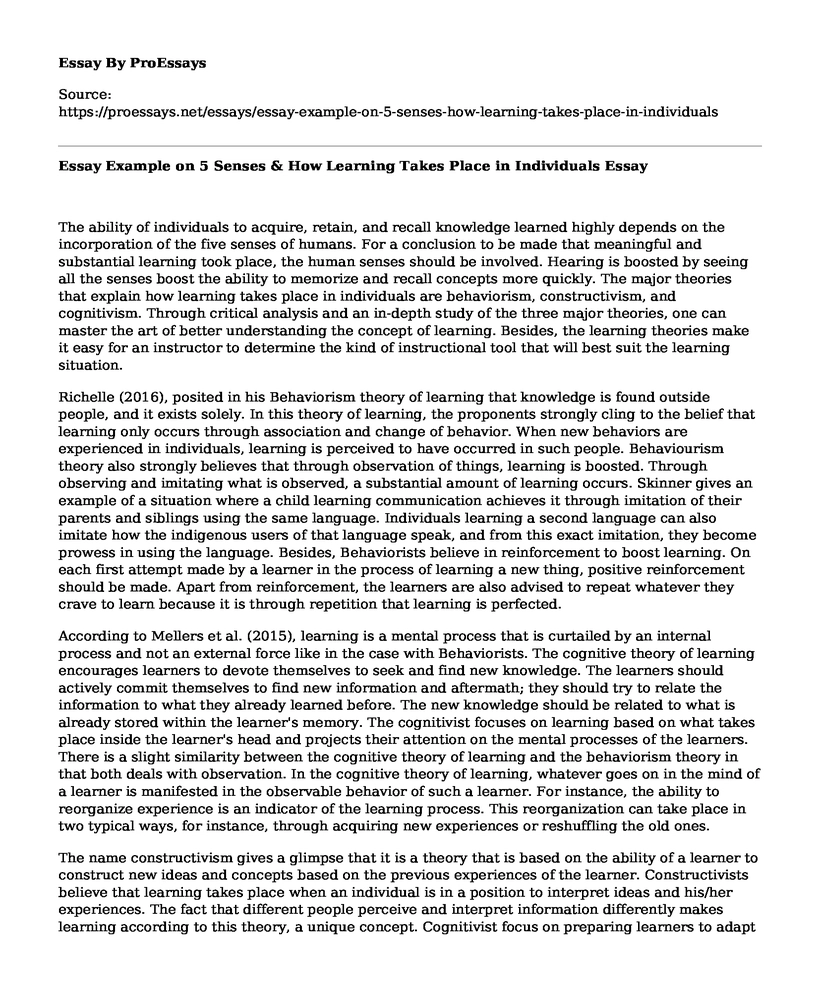The ability of individuals to acquire, retain, and recall knowledge learned highly depends on the incorporation of the five senses of humans. For a conclusion to be made that meaningful and substantial learning took place, the human senses should be involved. Hearing is boosted by seeing all the senses boost the ability to memorize and recall concepts more quickly. The major theories that explain how learning takes place in individuals are behaviorism, constructivism, and cognitivism. Through critical analysis and an in-depth study of the three major theories, one can master the art of better understanding the concept of learning. Besides, the learning theories make it easy for an instructor to determine the kind of instructional tool that will best suit the learning situation.
Richelle (2016), posited in his Behaviorism theory of learning that knowledge is found outside people, and it exists solely. In this theory of learning, the proponents strongly cling to the belief that learning only occurs through association and change of behavior. When new behaviors are experienced in individuals, learning is perceived to have occurred in such people. Behaviourism theory also strongly believes that through observation of things, learning is boosted. Through observing and imitating what is observed, a substantial amount of learning occurs. Skinner gives an example of a situation where a child learning communication achieves it through imitation of their parents and siblings using the same language. Individuals learning a second language can also imitate how the indigenous users of that language speak, and from this exact imitation, they become prowess in using the language. Besides, Behaviorists believe in reinforcement to boost learning. On each first attempt made by a learner in the process of learning a new thing, positive reinforcement should be made. Apart from reinforcement, the learners are also advised to repeat whatever they crave to learn because it is through repetition that learning is perfected.
According to Mellers et al. (2015), learning is a mental process that is curtailed by an internal process and not an external force like in the case with Behaviorists. The cognitive theory of learning encourages learners to devote themselves to seek and find new knowledge. The learners should actively commit themselves to find new information and aftermath; they should try to relate the information to what they already learned before. The new knowledge should be related to what is already stored within the learner's memory. The cognitivist focuses on learning based on what takes place inside the learner's head and projects their attention on the mental processes of the learners. There is a slight similarity between the cognitive theory of learning and the behaviorism theory in that both deals with observation. In the cognitive theory of learning, whatever goes on in the mind of a learner is manifested in the observable behavior of such a learner. For instance, the ability to reorganize experience is an indicator of the learning process. This reorganization can take place in two typical ways, for instance, through acquiring new experiences or reshuffling the old ones.
The name constructivism gives a glimpse that it is a theory that is based on the ability of a learner to construct new ideas and concepts based on the previous experiences of the learner. Constructivists believe that learning takes place when an individual is in a position to interpret ideas and his/her experiences. The fact that different people perceive and interpret information differently makes learning according to this theory, a unique concept. Cognitivist focus on preparing learners to adapt to the continually changing world effectively hence, in this way, the learners are prepared to be better problem solvers through correct interpretation and analysis of their experiences. Summarily, learning, according to cognitivism theory, is unpredicted because learners are left with the freedom to conceptualize and interpret experiences in their way and understanding.
References
Mellers, B., Stone, E., Atanasov, P., Rohrbaugh, N., Metz, S. E., Ungar, L., ... & Tetlock, P. (2015). The psychology of intelligence analysis: Drivers of prediction accuracy in world politics. Journal of experimental psychology: applied, 21(1), 1.doi: http://dx.doi.org/10.1037/xap0000040
Richelle, M. N. (2016). BF Skinner-a Reappraisal. Routledge.
Cite this page
Essay Example on 5 Senses & How Learning Takes Place in Individuals. (2023, Feb 27). Retrieved from https://proessays.net/essays/essay-example-on-5-senses-how-learning-takes-place-in-individuals
If you are the original author of this essay and no longer wish to have it published on the ProEssays website, please click below to request its removal:
- Promoting Health and Wellness in Children Essay
- From Baby Steps to Olympic Strides: Personal Essay About Success
- Does College Promote Individualism or Not Essay Example
- Paper Example on Baby Transforms From Newborn to Active Child
- Essay Example on Brothers' Fighting - Mama's Boiling Point!
- Essay on New Trends Transform American Education: Impact of Online Learning
- Navigating Boomerang and Failure-to-Launch: Challenges Faced by Young Adults Returning Home







